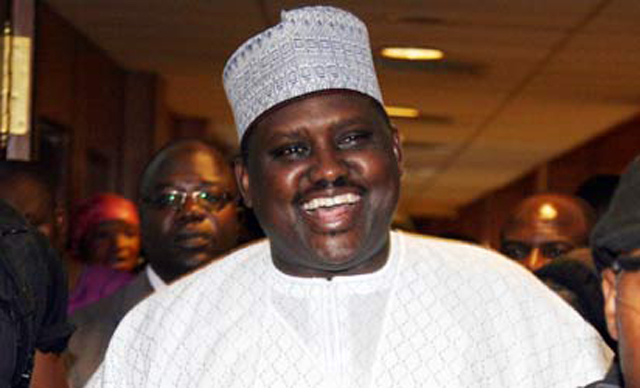He thumbed his nose at us. Abdulrasheed Maina, that is. As the former pension fund boss was being taken to Kuje correctional centre in Abuja, last week, he served the world with a beatific smile. No, it was a quiet laughter. No remorse; no apology to the nation and the pensioners he cheated. He laughed, not at his own calamity, but at the calamity of the Nigerian state.
His smile is the message. It is the mockery of the law; it is the mockery of the anti-graft war; it is the mockery of those who might be tempted to think that the law which he had dodged for the better part of three years, had caught up with him at last and now he must pay the legal penalty for cheating our struggling pensioners who put their money in the pension fund so that they who served their country in their youth might not be without food, clothes and shelter when their hair transforms itself from the colour black to the colour grey.
Take a breath.
We may not remember that Maina stole N2 billion from the pension fund he was appointed to protect; with everything about him being so opaque, we may never know how much was recovered from him and returned to the national treasury; we may not remember that the law gave him a slap on the wrist for his transgression against pensioners; we may not remember that he was sentenced to 61 years but will serve only eight years because the sentences will run concurrently in a cynical judicial joke. We may not remember that the law did not demonstrate its impotence; it demonstrated its reluctance to change the narrative about which thief deserves greater a punishment: the big thief or the small thief?
We may not also remember his protection from the law given by his friends in high places; we may not remember his reinstatement in the public service despite the clear case made against him; we may not remember that because the former Head of Service, Winifred Oyo-Ita, advised the president against reinstating him, she lost her job in shabby circumstances; she had dared to touch their anointed.
Take a breath.
But we will remember that smile; that laughter and that wave of the hand to his naïve fellow Nigerians. We will remember it because if a convict smiles at the world on his way to his lockup, he does more than taunt the Nigerian state and the commanders and the foot soldiers of the anti-graft war. It was his way of telling us that he was going into the correctional centre to relax until his protectors in high places think of a way to make his stay either short or not at all. He will not be numbered among the common prisoners. In his exalted position, the warders and the other prisoners will minister to his every need. His food will be special and not what the lesser criminals are fed; his cell will be an exclusive room and whatever he wants to make his stay pleasant would be provided for him.
He could mock us because he knows he is their anointed. He could mock us because he knows that sooner than later, he will bounce back into public reckoning and one of the newspapers or one of the agencies giving fake and dubious awards for sale will give him a new trophy as a model prisoner in Kuje correctional centre; an award that will wash him clean of whatever stains those who are jealous of his smartness in enriching himself at our collective expense might have thrown at his expensive baban riga.
Still, it should not be difficult for us to admit that there is nothing particularly new or surprising about Maina; his trial, his conviction and the judicial slap on his wrist are emblematic of the long-running anti-graft war destined to go on for ever without mortally wounding corruption. His cordial treatment by the law is in keeping with the tradition of our fighting the war with ambivalence. No war is ever won with ambivalence. But we know the cookies crumble differently under different circumstances of social inequality. It is the business of the law and the courts to protect the high up who are somebodies and, if you would excuse the word, piss on the sons of nobodies who are themselves nobodies. We were never made to be equal before the law. That would fly in the face of class-stratified human communities.
Weep not, brother.
The anti-graft war is likely to become a permanent war. Occasionally, the net will catch the big man. He will be put through the process in the courts to shame him but the table will turn and the Nigerian state will be shamed when the law treats him kindly and he thumbs his nose at the state and his traducers. If his loot is big enough for himself, the investigating and arresting officers, the prosecutors, his lawyers and the judge, he will emerge as the newly anointed in whom the law finds no scarlet stain. Steal big and the law tickles your chin with a glove; steal a N3,000 mobile handset, the law comes at you with a bazooka. It is the way the cookie crumbles.
Two years or so ago, a member of the House of Representatives from Ebonyi State decided on a more realistic approach to taming corruption. He submitted a bill to the House for a law to make the corrupt share their loot with the Nigerian state; something like 70:30. That way, the thief will not go home with the entire loot and the state will not lose entirely either. I thought it was hair-brained. I was wrong. He had a point. The bill did not appear to have gone anywhere.
The late Premier of the Northern Region, Sir Ahmadu Bello, Sardaunan Sokoto, once spoke on the difficulties of eradicating corruption. He said: “Corruption is a big matter and one which had given us a lot of anxious thought. It is all very well to say abolish corruption as though it was a thing that can be cut off by turning a tap or pressing a switch. No, it is a matter which springs from the very roots of human nature. Is there any country in the world which can honestly and convincingly claim to be absolutely free of corruption? I doubt it very much. In my opinion all that a government can do is to frown on these (corrupt) practices and endeavour to keep them in bounds …(so that corruption) does not become a bye word among men.”
Is the anti-graft war a waste of human and material resources? I don’t think so. Without it, warts and all, it could be worse, much worse, given the impunity as a bye word among our political leaders and their minions.

 Join Daily Trust WhatsApp Community For Quick Access To News and Happenings Around You.
Join Daily Trust WhatsApp Community For Quick Access To News and Happenings Around You.


